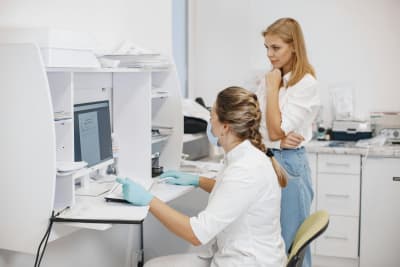Pharmacy technicians are needed in any establishment where drugs and medications are dispensed. Professionals in this field are not only experts at ensuring that patients get the right medication as prescribed by physicians, but they are also valuable for their organizational skills and their ability to liaise with insurance companies and other representatives.
The following guide will help aspiring pharmacy technicians gain an in-depth understanding of the requirements and considerations they need to keep in mind when entering the profession. They will also get a clear idea of their prospective duties and responsibilities, along with some insights as to their possible work environments and specialty focus.
The guide also explains the steps necessary to become a successful pharmacy technician and the annual average salary projections for the profession based on data from the Bureau of Labor Statistics.
What are a Pharmacy Tech’s Responsibilities?
Pharmacy technicians are absolutely vital to the smooth running of a pharmacy. Of course, nowadays most medical establishments have an in-house pharmacy, which makes these professionals valuable to the day-to-day activities of the majority of medical establishments in the country.
Even though pharmacy technicians can specialize in specific focus areas—as we will see below—there are still a few general responsibilities that professionals in this field must be trained to take on. These include, among others, ensuring that patients get the right medication as prescribed and keeping proper records of inventory and dispensations.
Pharmacy technicians may also be called upon to carry out the following tasks during a day’s work:
- Collecting information necessary to fill a prescription,
- Carrying out adequate measurements of the amount of medication necessary for prescriptions,
- Overseeing the packaging and labeling of prescriptions,
- Making pharmacists aware of possible shortages concerning supplies and medications,
- Collecting records of customers/patient information, including current prescriptions, and
- Acting as a liaison between pharmacists and customers who have questions concerning specific medications.
Pharmacy Technician Work Environment
Most pharmacy technicians work in pharmacies and drug retail stores. However, depending on their specialties and preferences, professionals in the field may explore other work environments.
For instance, some professionals can choose to work in hospitals. This is not limited to private hospitals alone, and we pharmacy technicians can also work in state and local hospitals, as well as ambulatory healthcare services.
Another common work environment for pharmacy technicians across the country is specialty food retail stores and groceries.
According to data provided by the Bureau of Labor Statistics, the distribution of Pharmacy technicians across work environments is as follows:
- 51% of Pharmacy technicians work in Pharmacies and Drug Retail,
- 17% work in Hospitals,
- 10% work in Grocery and Specialty Food Retail,
- 9% work with General Merchandise Retailers, and
- 4% work in Ambulatory Healthcare Services.
As for scheduling, the majority of pharmacy technicians work full-time, and some may be expected to work nights and weekend shifts.
How to Become a Pharmacy Technician
Prospective pharmacy technicians may follow the outline below in launching their careers on a successful foundation:
Basic Education
Even before receiving comprehensive pharmacy technology education, aspiring pharmacy technicians across the country are usually expected to meet a few basic educational requirements. These include having a high school diploma or GED and understanding foundational biology and chemistry.
Enrolling in an Accredited Program
After meeting the basic requirements, prospective pharmacy technicians can continue their journey by applying for an accredited training program. Employers usually value candidates who have graduated from such programs, especially those with an associate’s degree.
The associate degree programs for aspiring pharmacy technicians are available at community colleges and technical institutions across the country. Some programs offer a one-year certificate that is still valid, especially for those who would like to complement their education with more training on the job before they secure employment.
Practical Experience
Candidates usually combine their academic education with practical experience to become the best pharmacy technicians they can be. In fact, the best training programs always provide opportunities for candidates to develop their skills in the real world through internships, externships, and practicums.
Certification
Properly trained pharmacy technicians will compete with other fresh professionals for job placement. However, pursuing certification can give them a significant edge.
Several organizations across the country offer highly rated credentials for professionals in this field. Two of the most reputable organizations are the Pharmacy Technician Certification Board and the National Healthcareer Association. Candidates must have graduated from a training program or gained significant work experience to be certified by either organization.
They will also have to pass a professional examination.
Pharmacy Technician Specializations
As mentioned earlier, it is common for a pharmacy technician to choose a specialty area. This is typically done by those who would like to stand out or increase their chances of attaining a high level of expertise by focusing on one specific area of the profession.
Some possible specialty options for pharmacy technicians across the country include working as central pharmacy operations technicians, community pharmacy technicians, general pharmacy technicians, and laboratory pharmacy technicians.
Candidates can also specialize based on their work environment, such as by working exclusively with specialty food retailers, merchandise services, ambulatory healthcare services, and more.
Pharmacy Technician Salary & Career Outlook
The Bureau of Labor Statistics revealed that the annual average salary of a pharmacy technician in the United States is around $43,460. Data from the Bureau also showed that the lowest 10% still make an annual average salary of $35,100, while those who are among the highest-paid can end the year with around $59,450 or more.
Analyzing by work environment, pharmacy technicians in ambulatory healthcare services earn the highest average salary, around $49,920 per year. Those who work in hospitals make an annual average salary of $49,310, while professionals in general merchandise retailing manage an annual average salary of $46,180.
Career Outlook
The Bureau of Labor Statistics expects the employment rate for pharmacy technicians to grow by 7% between 2023 and 2033. This will lead to more than 47,000 job openings every year across the next decade.
The reasons for the projection include a larger number of older people requiring prescription medicines, the growing prevalence of chronic diseases, and the need for pharmacy technicians to replace pharmacists who will be needed for more patient care activities.





